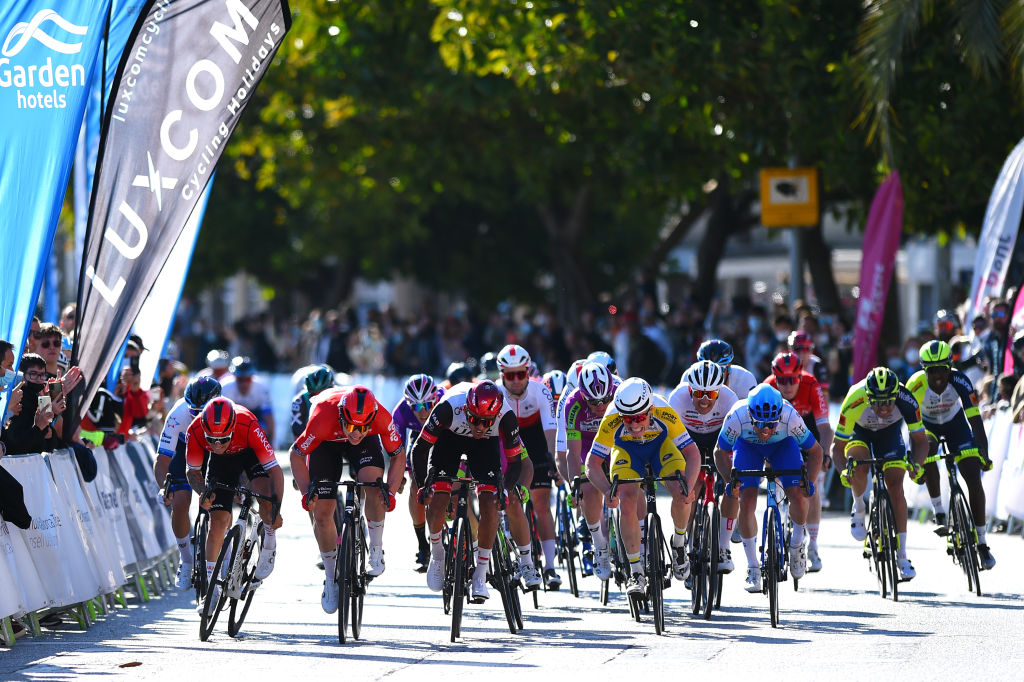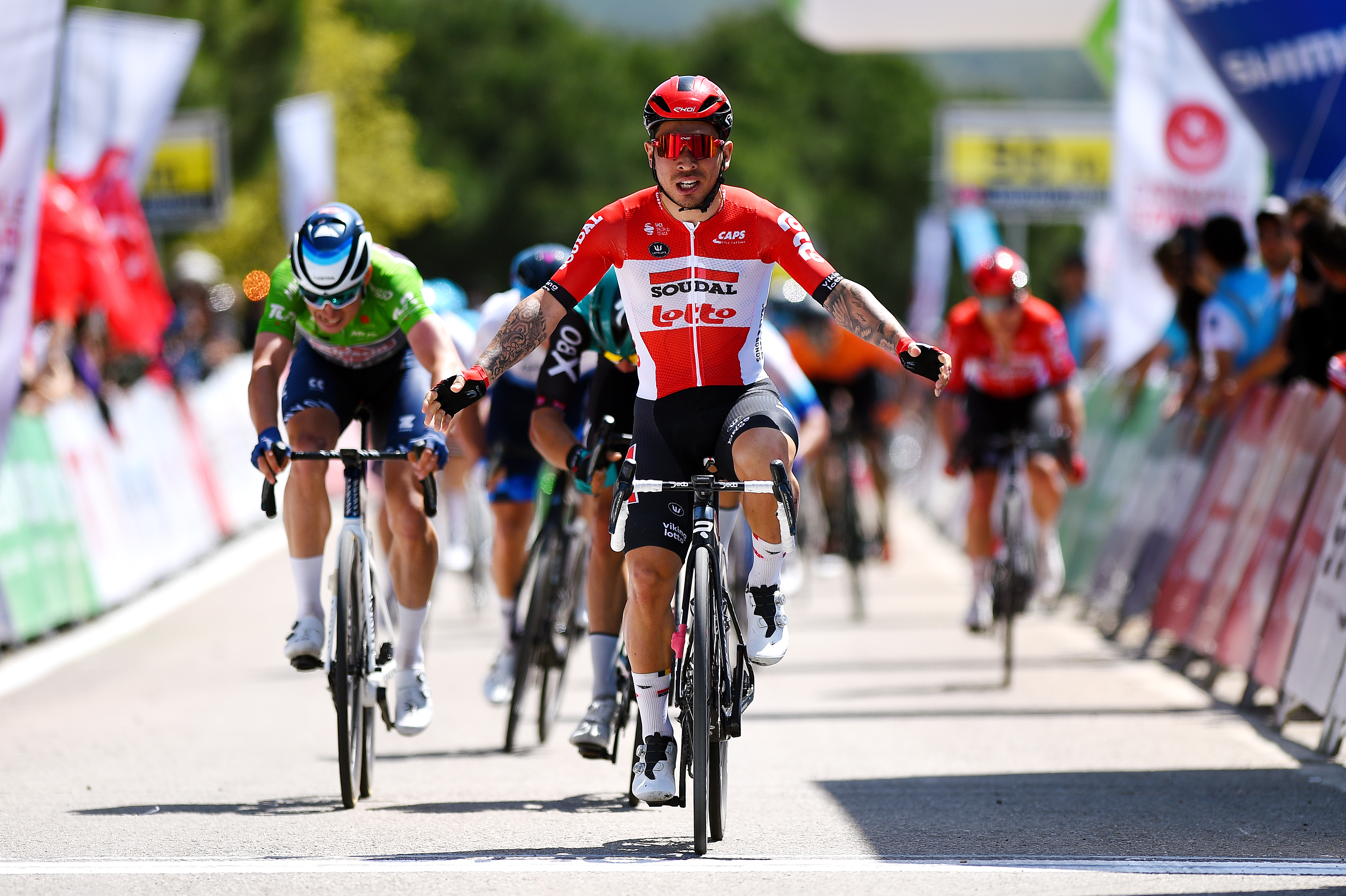How does the UCI WorldTour points system work?
A guide to how the international federation selects teams for the men's WorldTour every three years

The latest race content, interviews, features, reviews and expert buying guides, direct to your inbox!
You are now subscribed
Your newsletter sign-up was successful
Points earned in pro cycling races have never been more important for the top teams. In past years, points earned by riders were used to create the little considered UCI rankings and to determine team size for World Championships and Olympic Games. They became a lot more valuable after the WorldTour reforms in 2018.
As part of these reforms, the UCI has set a firm limit of 18 teams in pro cycling's top tier in return for guaranteeing teams place in the WorldTour for three years, as long as they continue to pass all the other criteria. The introduce a performance incentive, the UCI instituted a sporting criteria that requires teams to be in the top 18 of the triennial rankings to garner a WorldTour licence.
In the first time in WorldTour history, Israel Premier-Tech and Lotto-Soudal were relegated in 2023 while Arkéa-Samsic and Alpecin-Deceuninck were promoted from ProTeam to WorldTeam status.
Here Cyclingnews unravels the complex points structure that will determine which teams stay and which teams go.
WorldTour relegation would not be the end of the road for a team. As long as they continue to perform, teams can make it to the Tour de France and other major races thanks to the UCI rule that requires organisers to invite the two highest ranked ProTeams to all of the Grand Tours, and the top three to WorldTour one-day races. French ProTeams like TotalEnergies and B&B Hotel-KTM are also favoured with wild card invitations
However, riders' contracts have an exit clause in the event of the team not maintaining a WorldTour licence. If teams cannot keep their top riders it is increasingly difficult for them to secure a WorldTour licence.
WorldTour status is important for sponsors but the guarantee of a Tour de France start is by far the most critical factor in securing funding.
The latest race content, interviews, features, reviews and expert buying guides, direct to your inbox!
Alpecin-Fenix have not yet confirmed if they are seeking WorldTour status next year: the step up comes with additional financial requirements and a more intense race schedule, which means a bigger budget is necessary to perform in order to avoid relegation.
Why did the UCI create the promotion/relegation system?
When the UCI created the WorldTour (then called the ProTour) in 2004, they hoped to create a system where the best teams and riders would be at the best races throughout the season.
However, the UCI came up against intense pressure from the most powerful player in professional cycling - Tour de France organisers Amaury Sport Organisation - who objected to being forced to invite teams based on their UCI licence and argued for a way for teams to be promoted or relegated based on sporting performance (among other demands).
The ProTour became the WorldTour in 2009 after the first major reform and has been a continual exercise in negotiation with various stakeholders. In the latest reforms, the ASO got their merit-based system for inclusion and a limit of 18 teams in the WorldTour and a firm number of two 'wildcard' teams they can invite. In return, the WorldTeams won a more stable three-year licence, and the ProTeams earned more opportunities to be promoted.
What is the WorldTour points system?
The system, implemented in 2018, tallies the points scored by individual riders, assigns them to their respective teams, and comes up with a total from which the rankings are derived.
Every three years, the previous three years' rankings are added up and the top 18 teams - be they WorldTeam or ProTeam - are deemed to have satisfied the 'sporting' criteria for a WorldTour licence.
The scheme was actually supposed to start with the 2020 WorldTour but was delayed until 2023 due to the risk of a legal challenge. This may have arisen as teams raced in 2017 and 2018 before the rules were put into place, when they did not know how important points would be.
| Tier 1 | Tier 2 | Tier 3 | Tier 4 | Tier 5 | Tier 6 |
|---|---|---|---|---|---|
| Tour de France | Giro d'Italia | Milan-San Remo | Tour Down Under | Volta a Catalunya | Cadel Evans Great Ocean RR |
| Row 1 - Cell 0 | Vuelta a España | Tour of Flanders | Paris-Nice | E3 Saxo Bank Classic | UAE Tour |
| Row 2 - Cell 0 | Row 2 - Cell 1 | Paris-Roubaix | Tirreno-Adriatico | Itzulia Basque Country | Omloop Het Nieuwsblad |
| Row 3 - Cell 0 | Row 3 - Cell 1 | Liège-Bastogne-Liège | Gent-Wevelgem | La Fléche Wallonne | Brugge-De Panne |
| Row 4 - Cell 0 | Row 4 - Cell 1 | Il Lombardia | Amstel Gold Race | Donostia San Sebastian | Dwars door Vlaanderen |
| Row 5 - Cell 0 | Row 5 - Cell 1 | Row 5 - Cell 2 | Criterium du Dauphine | Tour de Pologne | Eschborn-Frankfurt |
| Row 6 - Cell 0 | Row 6 - Cell 1 | Row 6 - Cell 2 | Tour de Romandie | Benelux Tour | Tour of Guangxi |
| Row 7 - Cell 0 | Row 7 - Cell 1 | Row 7 - Cell 2 | Tour de Suisse | Bemer Cyclassics | Row 7 - Cell 5 |
| Row 8 - Cell 0 | Row 8 - Cell 1 | Row 8 - Cell 2 | Grand Prix de Québec | Bretagne-Ouest-France | Row 8 - Cell 5 |
| Row 9 - Cell 0 | Row 9 - Cell 1 | Row 9 - Cell 2 | Grand Prix de Montréal | Strade Bianche | Row 9 - Cell 5 |
Which teams earn points
Before 2016, only WorldTour teams could earn points toward the WorldTour team rankings but, in preparation for the promotion/relegation system, the UCI instituted the "World Ranking" in 2017 which allows both ProTeams and WorldTeams to gain points in WorldTour races.
Any UCI-registered team can earn points toward the World Rankings but the most valuable races in terms of points come at the WorldTour level, and only WorldTeams and ProTeams are allowed to compete in them.
All WorldTeams automatically qualify to race all WorldTour races. UCI rules require WorldTour races to invite the top-ranked ProTeam of the previous season - the top two teams when there are 18 WorldTeams for the Grand Tours, and the top three ProTeams for one-day races.
How are World Ranking points tallied?
The World Ranking teams points system tallies the points scored by the best 20 riders who are under contract with the team, and are published on Tuesday each week.
Riders earn points in races according to the various WorldTour tiers, ProSeries, class 1 races or various championships.
The points for each rider are tallied each week, the team rankings determined by the top 20 scorers. Then, every three years, the team points for the previous three seasons determine who will be in the WorldTour for the next three years.
Confusingly, the UCI also has individual, nation, one-day and stage-race rankings that are on a 52-week rolling basis but are not used for the promotion/relegation system directly.
What if a rider changes teams?

The points scored with a team stay with the team even if a rider leaves, and points earned before the rider joins - even if they raced without a team - do not transfer along with them to the new team.
For example, Lotto Soudal hired African Continental champion Reinardt Janse van Rensburg in May but his points for that victory will not count toward their 2022 season tally.
Where do teams earn points?
All of the UCI races count in different degrees for the World Rankings. In 2023, the UCI made a massive overhaul of how the points are awarded after criticisms that the previous system favoured minor races and one-day events over stages of Grand Tours.
The changes included adding a new tier to the previous five. The Tour de France is at the top tier, offering more points than any other race and in a tier all of its own. The overall winner earns 1,300 points, and points for stage placings went from the top three to top 15. Points are also awarded for leading the race on a stage or winning the points or mountains classification.
The Giro d'Italia and Vuelta a España are in the next step down, with winners earning 1,100 points.
The UCI added a third tier for the Monuments: Milan-San Remo, Paris-Roubaix, Tour of Flanders, Liège-Bastogne-Liège and Il Lombardia.
WorldTour stage races like Paris-Nice, the Tour de Romandie, Tour de Suisse and Tirreno-Adriatico with 800 points for winning.
| Rank | Tier 1 GC | Tier 2 GC | Tier 3 GC | Tier 4 GC | Tier 5 GC | Tier 6 GC |
|---|---|---|---|---|---|---|
| 1 | 1300 | 1100 | 800 | 500 | 400 | 300 |
| 2 | 1040 | 885 | 640 | 400 | 320 | 250 |
| 3 | 880 | 750 | 520 | 325 | 260 | 215 |
| 4 | 750 | 600 | 440 | 275 | 220 | 175 |
| 5 | 620 | 495 | 360 | 225 | 180 | 120 |
| 6 | 520 | 415 | 280 | 175 | 140 | 115 |
| 7 | 425 | 340 | 240 | 150 | 120 | 95 |
| 8 | 360 | 285 | 200 | 125 | 100 | 75 |
| 9 | 295 | 235 | 160 | 100 | 80 | 60 |
| 10 | 230 | 180 | 135 | 85 | 68 | 50 |
| 11 | 190 | 155 | 110 | 70 | 56 | 40 |
| 12 | 165 | 130 | 95 | 60 | 48 | 35 |
| 13 | 140 | 110 | 85 | 50 | 40 | 30 |
| 14 | 110 | 90 | 65 | 40 | 32 | 25 |
| 15 | 100 | 80 | 55 | 35 | 28 | 20 |
| 16 | 90 | 75 | 50 | 30 | 24 | 20 |
| 17 | 85 | 70 | 50 | 30 | 24 | 20 |
| 18 | 80 | 60 | 50 | 30 | 24 | 20 |
| 19 | 70 | 55 | 50 | 30 | 24 | 20 |
| 20 | 60 | 50 | 50 | 30 | 24 | 20 |
| 21-25 | 50 | 50 | 30 | 20 | 16 | 12 |
| 26-30 | 40 | 30 | 30 | 20 | 16 | 12 |
| 31-40 | 35 | 25 | 15 | 10 | 8 | 5 |
| 41-50 | 25 | 20 | 15 | 10 | 8 | 5 |
| 51-55 | 20 | 15 | 10 | 5 | 4 | 2 |
| 56-60 | 15 | 10 | 5 | 3 | 2 | 1 |
There are points for lower-tier races, World, Continental, and National Championships, the Olympic Games, etc. For a full accounting, you can visit the UCI Road Races rules (Part II, 2.10.008).

Laura Weislo has been with Cyclingnews since 2006 after making a switch from a career in science. As Managing Editor, she coordinates coverage for North American events and global news. As former elite-level road racer who dabbled in cyclo-cross and track, Laura has a passion for all three disciplines. When not working she likes to go camping and explore lesser traveled roads, paths and gravel tracks. Laura specialises in covering doping, anti-doping, UCI governance and performing data analysis.
